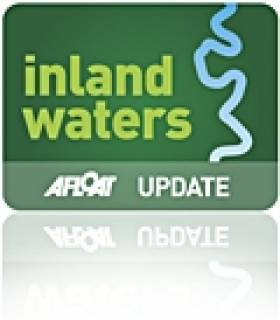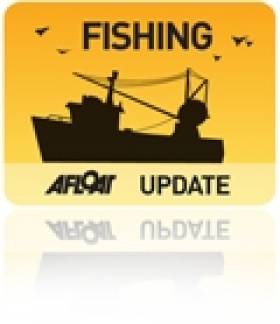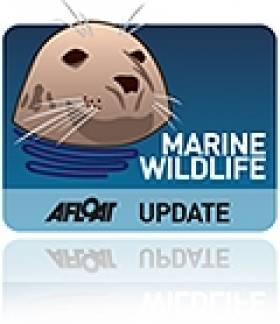Displaying items by tag: ecosystem
Trial Dredging to Help Rid Barrow of Invasive Asian Clam
#INLAND WATERWAYS - Trial dredging operations to curtail the spread of Asian clams at designated sites in the lower River Barrow are set to conclude today.
Inland Fisheries Ireland (IFI) employed the use of a a traditional cockle harvesting boat to physically remove the clams from the river bed, in an effort to explore methods of controlling or eradicating what it describes as an "ecosystem-changing invader" in other infested waters.
IFI scientists supervised the trials, using teams of divers to quantify the result of the dredging efforts.
The Asian clam (Corbicula fluminea) is "a most unwelcome addition to the fauna of the lower River Barrow". The bivalve mollusc is regarded as "one of the most notorious aquatic invasive species in the world".
First recorded in the river downstream of St Mullin’s in April 2010, subsequent IFI studies have revealed that the Asian clam is firmly established in the lower Barrow and in the River Nore downstream of Inistioge. Populations have also been recorded in the River Shannon and in Lough Derg.
In one section of the River Barrow the clam has achieved a "staggering" density of almost 10,000 per square metre.
Dr Joe Caffrey, senior scientist with IFI, said of the trial dregding: “It is imperative that every effort is made to control the expansion and spread of this highly adept invasive species.
"The results from these trials will inform future national management plans for this most unwelcome non-native species and will, at the very least, dramatically reduce the numbers of individuals in the test sites.
He added: "In tandem with these trials, research effort is being focused at producing other control methods that can be targeted as this species.”
NI Faces Big Fine Over Horse Mussels
#MARINE WILDLIFE - Northern Ireland faces a whopping £8 million (€9.6 million) fine from the EU over its failure to protect horse mussels.
According to BBC News, "little has been done" to protect horse mussel reefs in Strangford Lough despite promises from two government departments as far back as six years ago.
Last year Afloat.ie reported on a study from Queen's University Belfast that revealed the extent of damage to horse mussel reefs in the lough by fishing activity.
Strangford Lough is officially protected as a Special Conservation Area and a Marine Nature Reserve, as well as an Area of Special Scientfic Interest, but as BBC News states, "in reality there has been little protection put in place".
Horse mussels are pivotal to the lough's ecosystem, as some 100 other species rely on the reefs formed by the mussels in the seabed for their habitat.
NI officials now have just a few months to persuade the European Commission that they are taking strong action to protect the species, otherwise they will be charged with breaking EU directives.
BBC News has more on the story HERE.
Strong Debate Over Proposals for Fishing-Free Zones in Strangford Lough
#FISHING - Proposals to close substantial areas of Strangford Lough to fishing vessels have been met with strong criticism by Northern Ireland's commercial fishermen.
In a recent letter to the News Letter, Paul Leenan writes asking Fisheries Minister Michelle O'Neill to clarify the government's position following a complaint to the European Commission by the Ulster Wildlife Trust regarding the protection of horse mussel reefs in the lough.
While recognising the importance of the lough's marine ecosystem, Leenan writes: "The notion that substantial areas of the lough could be closed to fishing vessels is of serious concern to fishermen, at a time of great economic difficulty.
"Any hasty action could put livelihoods at risk and threaten the viability of the whole fishing industry here."
In response, the Ulster Wildlife Trust claims that "the management of certain aspects of the fauna and flora within the lough has caused... much concern over the past two decades."
Joe Furphy of the trust writes: "If we are to secure a truly sustainable future for the lough, its environment and diverse wildlife, upon which sustainable fisheries rely, then we need to ensure that adequate ‘non-disturbance zones’ are put in place."
Michael Viney writes in The Irish Times on growing concerns over lion's mane jellyfish and other harmful species in Irish waters.
The lion's mane is among the largest jellies found in Ireland and comes with a powerful sting, enough to disrupt "the stoical bliss normal to Dublin's Forty Foot bathing cove".
"Last year, the jellyfish was even more abundant in the Irish Sea than in 2009, and sightings from ferries found them from coast to coast," says Viney, who notes their and other jellies' dangerous effects on the marine industry and ocean ecosystems.
The decline of certain plankton-feeding species such as herring due to overfishing, coupled with a rise in sea temperature, has led to a marked increase of jellyfish of many different species in our waters such as the mauve stinger, which is blamed for decimating a Co Antrim fish farm's entire salmon stock.
The Irish Times has more on the story HERE.


































































